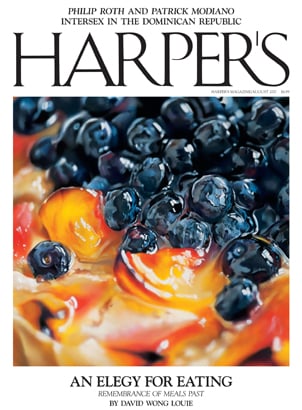Inside the August Issue
David Wong Louie, Sarah A. Topol, Helen Vendler, Philip Roth, and more...
 “Tell me what you eat, and I will tell you what you are,” wrote Jean Anthelme Brillat-Savarin in his epicurean bible, The Physiology of Taste. But what are we when we can eat no longer? It is a question most of us will never have to answer, since we go on noshing until we are a stone’s throw from the grave. David Wong Louie, alas, has not been so lucky. In 2011, this lifelong gourmand was informed that he had a cancerous tumor in his throat, which would prevent him indulging his greatest passion. “I loved to chew and swallow,” he writes. “My desire for food had the urgency of lust; I was constantly horny.” As he recounts in “Eat, Memory,” he was soon reduced to ingesting therapeutic smoothies from a feeding tube, and there is certainly an elegiac note to his chronicle—a farewell to what now strikes him as a culinary paradise lost. “Chewing was glorious,” he recalls. “Swallowing was king.” Yet he has lost none of his ability to evoke the sensuousness that makes even a half-decent meal an erotic experience—and, with surprising frequency, a kind of romance.
“Tell me what you eat, and I will tell you what you are,” wrote Jean Anthelme Brillat-Savarin in his epicurean bible, The Physiology of Taste. But what are we when we can eat no longer? It is a question most of us will never have to answer, since we go on noshing until we are a stone’s throw from the grave. David Wong Louie, alas, has not been so lucky. In 2011, this lifelong gourmand was informed that he had a cancerous tumor in his throat, which would prevent him indulging his greatest passion. “I loved to chew and swallow,” he writes. “My desire for food had the urgency of lust; I was constantly horny.” As he recounts in “Eat, Memory,” he was soon reduced to ingesting therapeutic smoothies from a feeding tube, and there is certainly an elegiac note to his chronicle—a farewell to what now strikes him as a culinary paradise lost. “Chewing was glorious,” he recalls. “Swallowing was king.” Yet he has lost none of his ability to evoke the sensuousness that makes even a half-decent meal an erotic experience—and, with surprising frequency, a kind of romance.
In “Sons and Daughters,” Sarah A. Topol visits a tiny village in the Dominican Republic where a genetic mutation has led to a prevalence of intersex children—that is, where children seem to transform from girls into boys at the onset of puberty. There are all sorts of ethical and scientific riddles posed by the population of Las Salinas, including the question of whether such children benefit from early corrective surgery. But the author is more interested in how easily the intersex inhabitants are accepted by their fellow villagers, especially given the prevalent machismo of Dominican culture. Closer to home, Richard Manning chronicles a transformation of political life in America’s Mountain West, where environmentalism is no longer the exclusive purview of tree-hugging liberals but a major driver of progressive change. As he writes in “Political Climbers,” public lands form the backbone of the region’s cultural identity and economy, and the struggle to preserve them may also offer an escape from the cul-de-sac of identity politics.
Elsewhere, we have an extraordinary portfolio of drawings by Olivier Kugler, bringing to life Syrian refugees who have resettled in England and Germany. Walter Kirn writes about the return of the dystopian note to American culture, and its latest iteration in Y.A. fiction, whose “story lines capture perfectly the plight of the adolescent psyche as it begins to chafe against authority.” Anthony Amsterdam contributes two poems, Helen Vendler delves into the expansionist ardor of A. R. Ammons’s verse, and in Akil Kumarasamy’s story, “New World,” Sri Lankan independence is the occasion for festivities, an Old Testament tempest, and at least one likely murder. Last but not least, in Readings, we have short works by Philip Roth and Patrick Modiano, and a list of dubious over-the-counter sexual-enhancement drugs including Anaconda, Cave Diver, O.M.G., Hard Wang, and the esteem-boosting Big Penis Male.



